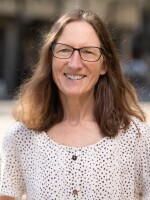Contact tracing and support is a critical tool to slow the spread of the coronavirus, but it’s time consuming. To help ease the burden, Lane County Public Health contracted with the University of Oregon, and they formed a group they call the Corona Corps.
Imagine you get a call from Lane County Public Health. You’ve been exposed to someone who tested positive for COVID-19 and you’re asked to isolate for 14 days. You may need help with testing or paying rent. You have lots of questions. The Student Corps to Combat Coronavirus will check in with you.
Angela Long is co-Director of the Corona Corps. She says, “Our job is to call, on a daily basis, those individuals who have been deemed to be a contact of a positive case in Lane County.”
Long says U of O students are a good fit for the work, adding, “We’re lucky here at the University of Oregon to have a real strong academic focus on public health. We have a wealth of programs that give us strong candidates.”
Long says there are about 22 callers, and another 25 nearly done with training. The contract with Lane County runs through December, and will renew as long as it’s needed.

Jason Davis with Lane County Public Health says contact calling is critical, especially since they’re seeing delays in test results. “We’ve found out through years of public health experience," says Davis, "that when an individual is asked to isolate they have a higher likelihood to do so if they have support and help.”
Davis says a contact is anyone who was within six feet of a known case during their infectious period for a cumulative time of over 15 minutes. He says because contacts may be pre-symptomatic, they need to quarantine, or the disease can get out of control.
Kaitlin O’Brien is a Counseling Psychology PhD student at U of O, and a Corona Corps team leader. She says they get documents about new contacts every morning. The first call takes about 30 minutes, according to O'Brien, “Talking about confidentiality, talking about HIPAA, talking about what our purpose is. We make sure they have thermometers, make sure they have people in the community that can drop off groceries for them, or run errands for them, etcetera, and so we really help problem solve.”
After that, they check in daily. O’Brien says they had compliance training as well as online and in-person role playing. They also have a dedicated liaison at Lane County Public Health. O'Brien says, “She really helped us train through the more difficult scenarios that we would probably encounter like someone who might be really frustrated, someone who’s really anxious, and then someone who really wanted resources.”

O’Brien says members of the household of a positive case can be surprised by how long they’re asked to quarantine. “It means 10 days of isolation for the case," says O'Brien, "or whenever the case is not symptomatic anymore or receives a negative COVID test, and then it’s 14 days after that. So that seems to be a shock for a lot of people because it seems like a really rare circumstance, but it’s actually pretty common.”
O’Brien says 14 days seems manageable for people, but any longer can be difficult. Angela Long says she’d like more people to be aware of the role of contacts, noting, “We do a really good job of doing a case count but we don’t report on the number of contacts that are quarantining for 14 days, sometimes longer.”
Davis says in Lane County lately, they’re monitoring about 350 isolating contacts. He says he wishes he could publicly thank them and Long agrees. She says, “The fact these individuals in our community are devoting this amount of time and really working hard to quarantine is just a tribute to their own dedication, and making that huge public health contribution.”
Davis says the public is key to public health. “We cannot accomplish anything without the public," he says. "My whole mission right now is to make that plea to please help by doing your part.”
Davis says people can help by limiting their social exposure. It will also reduce the number of people facing a two-week quarantine if you test positive.
Davis says the Oregon Health Authority has started awarding grants to organizations so they can assist in case management and contact tracing. Locally, the NAACP and a couple of neighborhood groups are on track to get started and Davis is optimistic about the role they can play.






